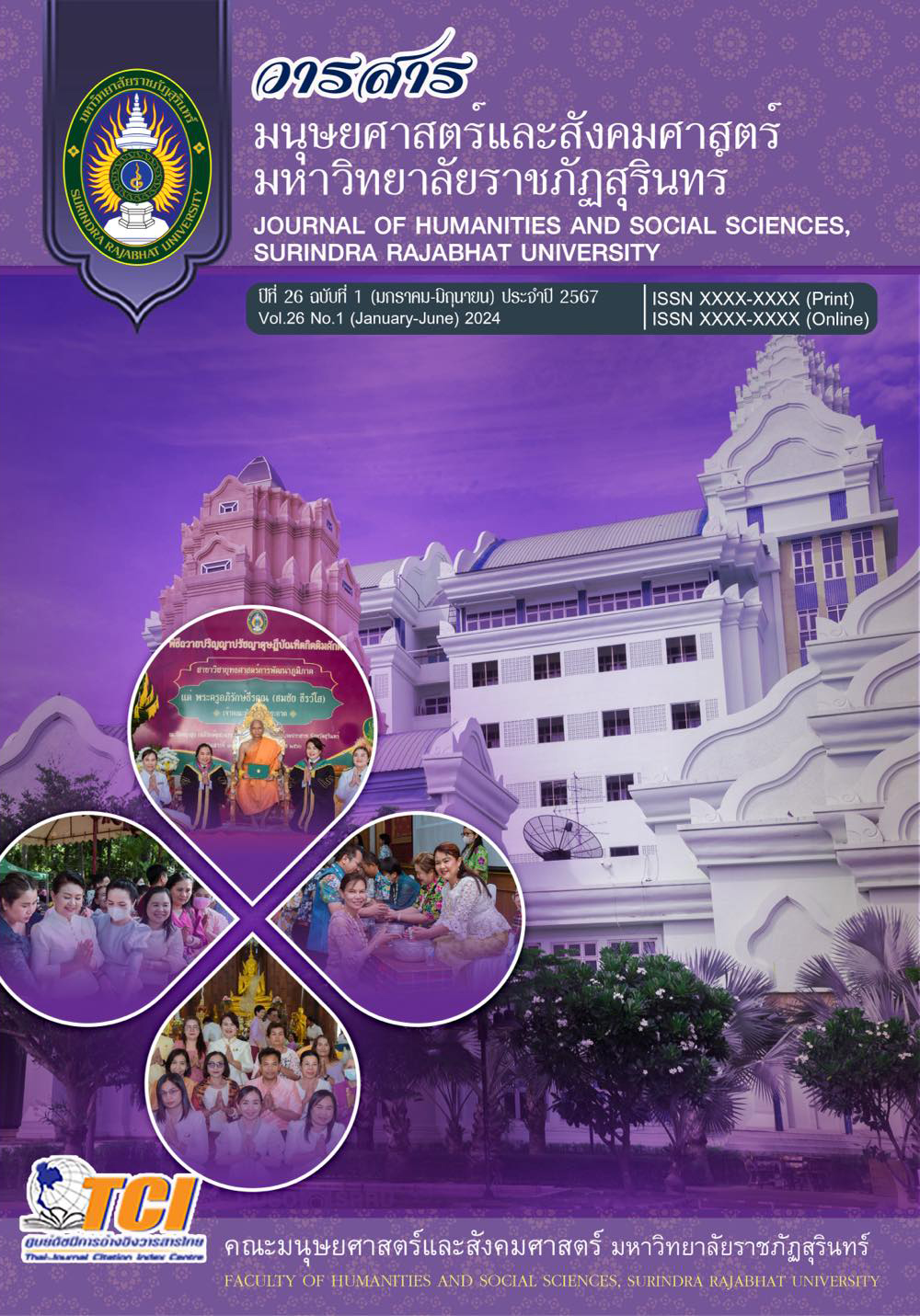ความร่วมมือเชิงกลยุทธ์เพื่อยกระดับคุณภาพการศึกษา : แนวทางการจัดการและความท้าทาย
คำสำคัญ:
ความร่วมมือเชิงกลยุทธ์, การยกระดับคุณภาพการศึกษา, แนวทางการจัดการ, ความท้าทายบทคัดย่อ
การศึกษาคุณภาพสูงจะวางรากฐานสำหรับการเติบโตที่ครอบคลุม ความยุติธรรมทางสังคม และการพัฒนาที่ยั่งยืน ด้วยการจัดเตรียมผู้เรียนด้วยความรู้ ทักษะ และค่านิยมที่จำเป็นในการนำทางในโลกที่ซับซ้อนและเชื่อมโยงถึงกันมากขึ้น ความร่วมมือเชิงกลยุทธ์ในด้านการศึกษามีพื้นฐานมาจากการยอมรับความท้าทายที่ซับซ้อนและหลากหลายแง่มุมที่ระบบการศึกษาทั่วโลกเผชิญอยู่ ความร่วมมือเชิงกลยุทธ์ในด้านการศึกษายังสอดคล้องกับเป้าหมายที่กว้างขึ้นในด้านการทำงานร่วมกันทางสังคม การพัฒนาเศรษฐกิจ และการพัฒนาที่ยั่งยืน การศึกษาครั้งนี้มีวัตถุประสงค์เพื่อศึกษาประเด็นความร่วมมือเชิงกลยุทธ์ เพื่อยกระดับคุณภาพการศึกษา การศึกษาครั้งนี้เป็นการศึกษาเอกสารทางวิชาการที่เกี่ยวข้องกับการเสริมพลังในเครือข่ายองค์กรการศึกษา การวิเคราะห์ด้วยวิธีการวิเคราะห์เนื้อหา ผลการศึกษาพบว่า 1) แนวทางความร่วมมือเชิงกลยุทธ์ด้านการศึกษา ได้แก่ ความร่วมมือระหว่างรัฐบาลและอุตสาหกรรม ความร่วมมือระหว่างสถาบัน ความร่วมมือระหว่างภาครัฐและเอกชน และ ความร่วมมือข้ามภาคส่วน 2) กลยุทธ์การจัดการเพื่อเพิ่มประสิทธิภาพการทำงานร่วมกัน ได้แก่ ความเป็นผู้นำและการกำกับดูแล การจัดสรรทรัพยากรและการจัดการ การสื่อสารและการแบ่งปันข้อมูล และ การติดตามและประเมินผล 3) ความท้าทายและอุปสรรคต่อการทำงานร่วมกันอย่างมีประสิทธิภาพ ได้แก่ ความแตกต่างทางวัฒนธรรมและสถาบัน พลวัตรของพลังอำนาจและการจัดตำแหน่งผู้มีส่วนได้ส่วนเสีย ข้อจำกัดด้านทรัพยากรและปัญหาด้านเงินทุน กรอบกฎหมายและข้อบังคับ และ ความยั่งยืนและความมุ่งมั่นระยะยาว
Downloads
เอกสารอ้างอิง
Adelman, M., & Taylor, L. (2018). “Partnerships between schools and health care providers : Promoting children’s mental health and academic success.” Child and Adolescent Psychiatric Clinics. 27(2) : 203 – 219.
Ansell, C., & Gash, A. (2008). “Collaborative governance in theory and practice.” Journal of Public Administration Research and Theory. 18(4) : 543 – 571.
Avolio, B. J., & Gardner, W. L. (2005). “Authentic leadership development: Getting to the root of positive forms of leadership.” The Leadership Quarterly. 16(3) : 315 – 338.
Baker, B. D., Oluwole, J., & Green, P. C. (2016). “Building partnerships in education research: The case of the Midwest Regional Educational Laboratory.” Educational Policy. 30(2) : 274 – 305.
Barro, R. J., & Lee, J. W. (2013). “A new data set of educational attainment in the world, 1950–2010.” Journal of Development Economics. 104 : 184 – 198.
Boggs, G. R. (2017). “The emergence of the University Innovation Alliance as a change agent in higher education.” Innovative Higher Education. 42(2) : 135 – 148.
Bozeman, B., & Boardman, C. (2014). “The National Institutes of Health/Food and Drug Administration/National Institute of Standards and Technology Partnership in Measurement Science for Standards for Biopharmaceutical Products : A case study in interagency collaboration and interinstitutional collaboration.” Public Organization Review. 14(4) : 509 – 526.
Bruns, B., Filmer, D., & Patrinos, H. A. (2011). Making schools work : New evidence on accountability reforms. The World Bank.
Bryk, A. S., Gomez, L. M., Grunow, A., & LeMahieu, P. G. (2015). Learning to improve : How America’s schools can get better at getting better. Harvard Education Press.
Bryson, J. M., Crosby, B. C., & Stone, M. M. (2014). “Designing and implementing cross-sector collaborations: Needed and challenging.” Public Administration Review. 74(6) : 733 - 746.
Chakroun, B., & Tilak, J. B. G. (2017). Partnerships in education : From philanthropy to social justice. Springer.
Cohen, M. D. (2017). “The fifth age of the five college consortium.” Change : The Magazine of Higher Learning. 49(4) : 12 – 19.
Davies, J., & Williamson, B. (2019). “Commercialization and privatisation in/of education: Policy networks and the ‘selling’ of English schools to international investors.” Globalisation, Societies and Education. 17(3) : 365 – 380.
Fullan, M. (2014). Leading in a culture of change. John Wiley & Sons.
Hanushek, E. A. (2021). “Education and economic growth.” Education Economics. 29(1) : 1 – 18.
Hanushek, E. A., & Woessmann, L. (2015). The knowledge capital of nations: Education and the economics of growth. MIT Press.
Huddleston, A. (2019). “Partnerships between schools and employers : A systematic review of the literature.” Education Policy Analysis Archives. 27(43) : 1 – 30.
Huxham, C., & Vangen, S. (2013). Managing to collaborate : The theory and practice of collaborative advantage. Routledge.
Hyvönen, P., & Haavisto, I. (2016). “Corporate social responsibility in Finnish and Swedish schools : Education as a means for global social justice.” In Corporate social responsibility in Scandinavia. K. Ragnarsdóttir & A. D. Iorio (Eds.). (pp. 205 – 220). Springer.
Kezar, A., & Lester, J. ( 2011). Organizing higher education for collaboration : A guide for campus leaders. John Wiley & Sons.
Muralidharan, K., & Sundararaman, V. (2011). “Teacher performance pay: Experimental evidence from India.” Journal of Political Economy. 119(1) : 39 – 77.
OECD. (2018). Education at a Glance 2018 : OECD Indicators. OECD Publishing.
Penuel, W. R., & Gallagher, D. J. (2017). Creating research–practice partnerships in education. Harvard Education Press.
Sellar, S., & Hogan, A. (2014). “Governing by inspection? Comparative perspectives on education governance and the regulatory state.” In Fabricating quality in education : Data and governance in Europe. J. Ozga, P. Dahler-Larsen, C. Segerholm, & H. Simola (Eds.). (pp. 43–64). Routledge.
Spillane, J. P., Halverson, R., & Diamond, J. B. (2004). “Towards a theory of leadership practice: A distributed perspective.” Journal of Curriculum Studies. 36(1) : 3 – 34.
Tan, T. K. (2019). “The economic rationale of policy design : Singapore's digital education initiatives in the era of the fourth industrial revolution.” Journal of Educational Change. 20(4) : 465 – 486.
Tooley, J., & Dixon, P. (2019). “The transformative power of partnership schools : The story of Western Liberia.” British Educational Research Journal. 45(3) : 443 – 463.
UNDP. (2020). Human Development Report 2020 : The Next Frontier - Human Development and the Anthropocene. United Nations Development Programme.
UNESCO. (2020). Global Education Monitoring Report 2020 : Inclusion and Education : All Means All. UNESCO Publishing.
UNICEF. (2021). The State of the World’s Children 2021 : On my mind - Promoting, protecting and caring for children’s mental health. UNICEF.
Verger, A., Lubienski, C., & Steiner-Khamsi, G. (2016). “The rise of public – private partnerships in education: An analysis of global trends.” Education Policy Analysis Archives. 24(93) : 1 – 30.











